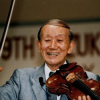Shinichi Suzuki

Shinichi Suzuki
Shinichi Suzukiwas a Japanese musician, philosopher, and educator and the inventor of the international Suzuki method of music education and developed a philosophy for educating people of all ages and abilities. Considered an influential pedagogue in music education of children, he often spoke of the ability of all children to learn things well, especially in the right environment, and of developing the heart and building the character of music students through their music education. Before his time, it was rare...
NationalityJapanese
ProfessionTeacher
Date of Birth17 October 1898
CountryJapan
Live by looking for things to do for other people.
Every child grows; everything depends on the teacher.
Man is a child of his environment
I cannot live without children.
Where love is deep, much can be accomplished.
I play with children so that I can learn from them.
It is in our power to educate all the children of the world to become a little better as people, a little happier.
Wrong education and upbringing produces ugly personalities, whereas a fine upbringing and good education will bring forth superior sense and feeling, as well as nobility and purity of mind.
What is man's ultimate direction in life? It is to look for love, truth, virtue, and beauty.
To make a resolution and act accordingly is to live with hope. There may be difficulties and hardships, but not disappointment or despair if you follow the path steadily. Do not hurry. This is a fundamental rule. If you hurry and collapse or tumble down, nothing is achieved. DO not rest in your efforts; this is another fundamental rule. Without stopping, without haste, carefully taking a step at a time forward will surely get you there.
Knowledge is not skill. Knowledge plus ten thousand times is skill.
It is necessary to be concerned about the importance of educating a really beautiful human spirit
Talent is no accident of birth. In today's society a good many people seem to have the idea that if one is born without talent, there is nothing he can do about it; they simply resign themselves to what they consider to be their fate.
Music is the language of the heart without words.